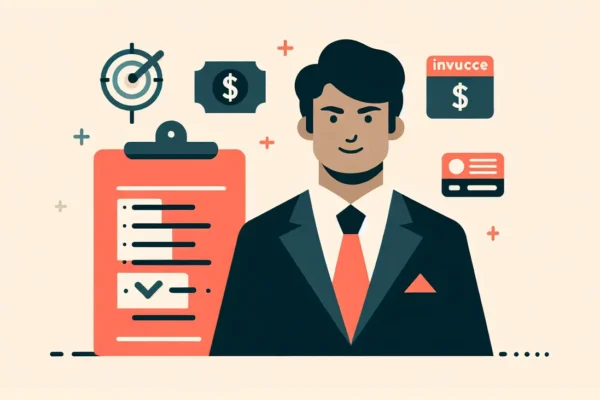In the ever-evolving landscape of business, ensuring financial stability is paramount. For many businesses, commercial debt collection plays a critical role in maintaining healthy cash flow and protecting the future of the company. In this blog post, we’ll explore effective strategies for managing commercial debt collection and how it can secure your business’s future.
Understanding the Importance of Commercial Debt Collection
Commercial debt collection is more than just recovering outstanding payments; it’s about safeguarding the financial health of your business. By proactively managing debts, businesses can ensure a steady cash flow, minimize losses, and enhance their ability to invest and grow. The significance of debt collection goes beyond immediate payment recovery. It serves as a building block for a solid financial foundation, which is crucial for long-term stability. As companies expand, their financial demands also grow; hence, maintaining a reliable income stream becomes indispensable.
Consider small businesses that fail to recover a substantial portion of their invoices. This not only affects their ability to pay their own bills but also limits their opportunities for expansion and innovation. By regularly assessing the creditworthiness of clients and setting strict payment terms, companies can significantly mitigate their risk exposure. In turn, this risk reduction fosters a more resilient business environment where growth can be strategically pursued. Additionally, when companies develop robust debt collection systems, they cultivate an organizational culture that values fiscal responsibility, which is vital in times of economic volatility.
Key Strategies for Effective Debt Collection
Adopting a strategic approach to debt collection can make a significant difference. This includes setting clear credit policies from the outset, regularly monitoring accounts, and making timely contact with clients to address any issues early on. One pivotal strategy involves segmenting clients based on their payment behaviors and tailoring communication accordingly. For example, offering flexible payment plans to reliable clients can encourage quicker settlements. Conversely, firmer reminders might be required for habitual late payers to ensure compliance with agreed terms.
Another tactic is to develop a precise debt collection timeline which acts as an internal guide, detailing when and how to communicate with clients. This timeline ensures consistency and keeps the business on track. Furthermore, empowering your accounts team with effective negotiation skills can turn a potentially adversarial process into a collaborative one. Training sessions focusing on persuasion techniques or conflict resolution can enable your team to deal with delinquent accounts more effectively. Also, it’s advantageous to maintain an open-door policy, allowing clients to freely discuss their financial issues, thereby fostering goodwill and a more cooperative repayment process.
Building Strong Client Relationships
Maintaining a positive relationship with clients is crucial, even when dealing with debt collection. Open communication and understanding can facilitate smoother payment processes and reduce the likelihood of disputes. When businesses approach debt collection with empathy, they not only secure payments but also strengthen customer loyalty. A gentle reminder or a personal call can often prompt action without damaging the rapport you have built. This approach emphasizes the human aspect of business transactions, recognizing that sometimes unforeseen circumstances necessitate empathy and flexibility.
Implementing a personalized debt recovery approach is another major asset. Personalized interactions show clients that your business values them as individuals, respecting their unique situations. Additionally, regular check-ins and feedback sessions can identify potential issues before they escalate. By consistently demonstrating that you are invested in their success, clients are more likely to respond positively and prioritize your invoices over others. Furthermore, a solid network of satisfied clients can be invaluable for word-of-mouth referrals, which are crucial for growth in competitive markets.
Leveraging Technology for Efficient Debt Collection
Incorporating technology into your debt collection process can streamline operations. Automated reminders, debt management software, and online payment systems are just a few tools that can enhance efficiency and improve overall collection rates. Technology not only saves time but also reduces the likelihood of human error, ensuring consistency in communication and collections. Moreover, implementing customer relationship management (CRM) systems can enhance client interactions, allowing a detailed track record of each client’s payment history and preferences.
Technology also enables data-driven decision-making. By analyzing payment patterns and client behaviors, businesses can predict potential delinquencies and intervene proactively. This foresight can avert major payment issues before they occur. Additionally, integrating artificial intelligence in debt collection strategies offers further benefits. AI can automate routine tasks, such as sending reminders or processing payments, thus freeing up human resources for more complex negotiations. Ultimately, the strategic use of technology can render the debt collection process less intrusive and more aligned with modern client expectations, establishing a smoother operational workflow.
Navigating Legal Considerations
Understanding the legal aspects of debt collection is essential to avoid potential pitfalls. Complying with relevant laws and regulations ensures that your collection efforts are ethical and lawful, protecting your business from potential legal challenges. It’s imperative to familiarize yourself with the Fair Debt Collection Practices Act (FDCPA) and other applicable local regulations to ensure compliance. This not only keeps your business on the right side of the law but also upholds your reputation as a fair and responsible business entity.
Partnering with a reputable legal advisor or firm can also provide invaluable guidance and representation when necessary. They can help review your debt collection protocols and advise on the appropriate measures for mitigating legal risk. Furthermore, incorporating legal counsel into the development of your collection strategies ensures alignment with current legislative changes and best practices. Remember, a proactive approach to legal matters can circumvent costly disputes and enhance client trust, as clients will feel assured knowing that they are dealing with a business that values transparency and legality.
Securing Your Business’s Future with Strategic Debt Collection
Effective commercial debt collection is a vital component of financial stability for any business. By implementing clear policies, communicating transparently, and leveraging legal and technological resources, businesses can better manage their receivables and secure their financial future. Remember, the key to success lies in being proactive and persistent while maintaining a positive relationship with your clients.







